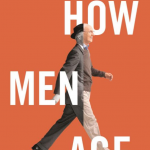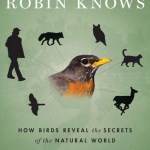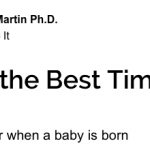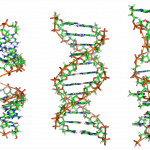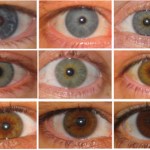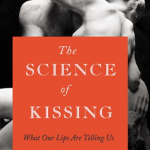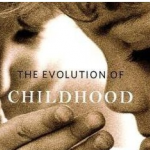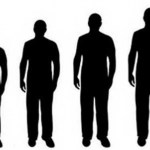Many years ago, Mel Konner, Marjorie shostak, and Boyd Eaton wrote "The Paleolithic Prescription: A program of diet and exercise and a design for living." (It is hard to find these days. To find it and related titles on Amazon, look for this book first, and track the PP down via the author name Konner.)
(Added: You can probably get the The Paleolithic Prescription here.)
Richard G. Bribiescas is professor of anthropology and ecology and evolutionary biology at Yale University, where he also serves as deputy provost for faculty development and diversity. He is the author of Men:…
behavioral biology
There was a dead rabbit in the middle of the road today. I suspected such a thing, nearby, just out of sight, and edible, because I noticed some crows taking off whenever a car went by. Then, when I went over, I could see the rabbit that they were feasting on between drive-bys.
I had been looking for rabbits lately, because of this: the cat had switched to hanging out by the upstairs window, the better to observe the just arriving Juncos (snow birds, it is fall). She had previously spent most of her time observing rabbits from the lower, ground level windows, until just the other day when…
The latest National Geographic Roundtable Question: Survivor-style television has grown increasingly popular over the years and done a great job of illustrating our brain's fascinating built-in survival instinct. What role do you think our ancestral instincts play today in helping us survive, thrive and accomplish our goals? How much of our ancestral survival instincts are innate verses learned?
First, the innate vs. learned part of the question. This is a false dichotomy. We have evolved to learn. We probably have "built in" mechanisms to learn new things. This means that when we have…
I'm not going to say that Ron Howard is old or anything, but he isn't Opie any more. (And, in fact, it has been fascinating and inspiring to watch his career, by the way.) Anyway, Howard produced a new documentary with National Geographic called "Breakthrough: The Age of Aging, which premieres Sunday, November 29 at 9 pm et on National Geographic Channel. And, pursuant to this, National Geographic's web site is sponsoring a Roundtable on the topic. The roundtable addresses the question, "By treating aging as a disease are we just prolonging the inevitable or can we change the course of our…
Every now and then an animal shows up where it is unexpected. Why just the other day a black bear had to be coaxed out of a tree down by the middle school, a couple of blocks form here. Even though our marshes, woodlands, and small patches of prairie house cougars, coyotes, deer, and all the smaller critters, both bears and wolves are not at present endemic to the Twin Cities suburbs.
When the unexpected appearance of a wild animal happens, there are usually one three factors at play. A migratory animal (typically a bird) is a bit off course, or lands where it normally flies over. The…
After, not before, you get to the hospital, I always say.
But seriously, Robert Martin, the famous primatologist, has an interesting piece in Psychology Today exploring this question. Go read it. I've got a few thoughts spurred by this research I'll list briefly here.
First, it seems that wild primates give birth during their daily down-time, the period of time that they are generally inactive. Dirunal primates do so more at night, nocturnal primates do so more during the day. Various reasons have been proposed. I've not read the primary literature on this, but in my ignorance I wanted to…
Jonathan Marks' new book is called "Tales of the Ex-Apes: How We Think about Human Evolution"
I've got to tell you that when I first saw the title of this book, the letters played in my head a bit. Tails of the Ex-Apes. That would be funny because apes don't have tails. Or Tales of the Exapes. Pronounced as you wish. Perhaps in an Aztec accent.
Anyway...
Jon Marks is a colleague and a friend from way back. He is a biological anthropologist who has engaged in critical study of central biological themes, such as genetics, and he's said a few things about race. He wears black, often does…
The authors of a new paper note that "one of the principal ways in which we interact using our faces is kissing." This reminds me of an old National Lampoon joke on how the French were famous for inventing sex acts with the face. But I digress.
This paper looks at neural imaging responses of subjects who observe, in photographs, various kinds of kissing. The two main variables are who is kissing (by gender) and the nature of the kiss.
One of the authors is my friend and colleague, Sheril Kirshenbaum. She wrote the book on kissing. No, seriously, she wrote this book, which I've reviewed…
Of course they do. To the extent that genes make you anything in particular, though the role of genetics in human behavior is pretty limited.
You've probably heard about the newly reported research in which a genetic link was found to homosexuality in a study of gay brothers. Kelly Servick has a good writeup on it here. The study looked at 409 pairs of gay brothers, and found a region on the X chromosome that was similar across the sample. This sort of shotgun approach, comparing a trait (in this case, gayness) with a bunch of DNA (I oversimplify) is very likely to get results that look real…
It has long been known by humans that female mammals can be attracted with the call of a young in distress. There is a famous documentary film of the Hadza, a foraging group in Tanzania, in which this method is used by young boys to trap Dasssies (rock Hyrax). First you catch a baby Dassie (not hard) then you hid and bit it in the neck so it cries out, then when the momma Dassies come to rescue it you shoot them at short range with an arrow or whack them with a stick. Adult Efe Pygmy hunters sometimes imitate the call of a young Duiker (a forest antelope) in distress in order to draw in…
Imagine that there is a trait observed among people that seems to occur more frequently in some families and not others. One might suspect that the trait is inherited genetically. Imagine researchers looking for the genetic underpinning of this trait and at first, not finding it. What might you conclude? It could be reasonable to conclude that the genetic underpinning of the trait is elusive, perhaps complicated with multiple genes, or that there is a non-genetic component, also not yet identified, that makes finding the genetic component harder. Eventually, you might assume, the gene will be…
Whitey Bulger has finally been convicted of a small percentage of all the bad things he is said to have done. The Boston Globe has the details.
James J. “Whitey” Bulger, the notorious Boston gangster who rampaged through the city’s underworld for decades before slipping away from authorities and eluding a worldwide manhunt for more than 16 years, was convicted today in federal court of charges that will likely keep him in prison for the rest of his life.
Don't count on that. Whitey has slipped from the clutches of justice several times before. He'll probably make a break for it between…
In behavioral biology there is a fair amount of attention to individual quality, which may be determined by genes or parasite load or energy balance, or some interaction among these (and other) factors. Individual quality is honestly indicated by some trait or behavior; a large bright thing hanging of your head, a long bout of complex and energetic dancing, or a very loud complicated song, may be impossible to achieve in an individual with insufficient energy or some sort of disease. Therefore, other individuals looking to choose a mate can observe the traits or behaviors and do what the…
Humans appear to have a great deal of variation in sexual orientation, in what is often referred to as "gender" and in adult behavior generally. When convenient, people will point to "genes" as the "cause" of any particular subset of this diversity (or all of it). When convenient, people will point to "culture" as the "cause" of ... whatever. The "real" story is more complicated, less clear, and very interesting. And, starting now, I promise to stop using so many "scare" quotes.
Fixed up and reposted.
Prior to birth there are a number of factors than can influence things like gender or…
Valentine’s Day is coming up, so it is time to think about kissing. Pursuant to this, Sheril Kirshenbaum, author of “The Science of Kissing,” has made the Kindle version of her excellent book available at a discounted price through February 18th. The book is here: The Science of Kissing: What Our Lips Are Telling Us. (Sheril is also the co-author of Unscientific America: How Scientific Illiteracy Threatens our Future.)
The Science of Kissing
Further details as well as a video (don’t worry, it’s work safe) are here, on Sheril’s site.
Also pursuant to Valentine’s Day, I thought it…
Human infants require more care than they should, if we form our expectations based on closely related species (apes, and more generally, Old World simian primates). It has been said that humans are born three months early. This is not accurate. It was thought that our body size predicted a 12, instead of 9 month gestation, and some suggested that Neanderthals would have had such, but this research conclusion has been set aside based on new analysis. But it is still true that developmentally, human children do not reach a stage of development that allows some degree of self care for a…
Darwinian Psychology, or really, any “Psychology” that claims to be science, will operate under the assumption that the human brain, as an organ, has arrived at its modern form through the process of evolution, which includes a certain amount of design through Natural Selection. It does not take that much additional sophistication to realize that the human brain is not only good at, but absolutely requires for typical functioning, a great deal of learning. Therefore, it is reasonable to assume that the typical human brain functions as it does because of information provided by the genes that…
Rebecca Watson gave the following talk at Skeptcon. It is funny, well done, and critiques a Pop-Evol-Psy concept or two, which I have also addressed (Why Do Men Hunt and Women Shop?, Understanding Sex Differences in Humans: What do we learn from nature?, Falsehoods: Human Universals, A Tutorial in Human Behavioral Biology, Driving The Patriarchy: Demonic Males, Feminism, and Genetic Determinism, Race, Gender, IQ and Nature, What is the most important human adaptation?, How Do You Get Sexual Orientation and Gender in Humans?, Men = Testosterone Damaged Women!, Sex and Gender in An Odd…
The title of this post is, of course, a parody of the sociobiological, or in modern parlance, the "evolutionary psychology" argument linking behaviors that evolved in our species during the long slog known as The Pleistocene with today's behavior in the modern predator-free food-rich world. And, it is a very sound argument. If, by "sound" you mean "sounds good unless you listen really hard."
I list this argument among the falsehoods that I write about, but really, this is a category of argument with numerous little sub-arguments, and one about which I could write as many blog posts as I…
Nature is a potential source of guidance for our behavior, morals, ethics, and other more mundane decisions such as how to build an airplane and what to eat for breakfast. When it comes to airplanes, you'd better be a servant to the rules of nature or the airplane will go splat. When it comes to breakfast, it has been shown that knowing about our evolutionary history can at times be a more efficacious guide to good nutrition than the research employed by the FDA, but you can live without this approach. Nature works when it comes to behavior too, but there are consequences. You probably…
